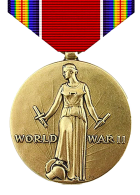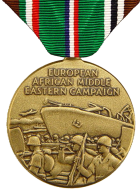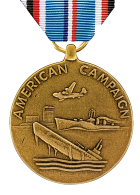My name is Gene Massone once of the 296th Engineer (combat) Battalion of the First Army consisting of about 900 men attached to the 1120th Engineer Combat Group in the VII Army Corps. We landed in Normandy Beach on D-Day plus 16. Our orders were to support the 9th division, which had landed at Omaha Beach on D-Day. There were 6 or so Engineer Battalions in each Corps and each Battalion was assigned to whatever infantry or armored division in the first army that might be in need of our services at any particular time.
On July 18th, our Battalion received notice that it was attached to the 9th infantry division of the First Army and we were to advance in our sector. Our mission was to open and maintain the road, to remove minefields. This road was known as route "9" for allied bombers. Our drive was to be proceeded by a full-scale assault by thousands of allied bombers. The sky, in all directions as one could see, was full of all kinds of aircraft. The bombing started. Many of the bombs fell on our lines in error, injuring and killing some of our troops. The bombing was so massive, and the sound of the bombing was so deafening, that I found myself trying to squeeze my body into a 16-inch culvert pipe that crossed under the road. I managed to get my head and shoulders into the pipe to escape the deafening roar of the bombs and I figured that if I got hit it would be in my legs and butt and would not be fatal.
From July 25th to 27th we played a main role supporting the 4th Infantry Division and the 30th Armored Division in the breakthrough. Our Battalion successfully accomplished its mission of mine sweeping; repairing and maintaining route “B” on which the 1st Infantry and the famed 3rd armored division moved through Marigny.
Later we were surprised to learn that a Corporal and the company photographer captured the first German prisoner in the St. Lo "breakthrough". He was our combat battalion photographer. The picture of him and the prisoner were on the front pages of the Sunday newspapers back home. We found out that this prisoner was only 16 years old. We had two suicides by self-inflicted wounds. Some of the men just could not take the strain of battle in Europe.The battalion reverted to the 111th Group on July 28th and continued with its roadwork in the First Army area. Now came our "Gypsy Caravan Days". We moved forward almost twice a week. The trucks were piled up higher and higher with each move as trinkets and souvenirs were accumulated.
On August 10th, we moved to the city of Viledieu and August 15th to Mortain, which was still burning. Near Mortain evidently the engineers missed a land mine in the road and while on a reconnaissance mission on hill 314, just east of Mortain, a Captain and a M/Sgt struck a German "teller mine" with their 1- ton weapons carrier. The Captain’s right leg was shattered and the Sgt suffered minor injuries. We started our monstrous bridge building campaign. Our Battalion reconstructed over a dozen bombed out bridges on our way through France and Germany, many while under enemy fire.
Then the powers that be figured we needed a rest. We were pulled out of action, brought to the rear, given hot showers and new uniforms then piled onto trucks and taken to Breman-Haven, loaded onto a cruise boat, which took us to Copenhagen, Denmark to a fancy hotel where we were given VIP treatment. They call it R&R (rest and relaxation). We were fed steak dinners. Morning breakfast consisted of fresh eggs, fresh milk etceteras. These things we hadn't tasted since leaving England. The week went by too darn fast. Then we were sent back to the war. We continued on our way removing land mines, filling bomb craters, and building barbed wire p.o.w enclosures, ducking German artillery, and minefields. We then arrived in the vicinity of Javron where 40 trucks hauled equipment to Corbeil located near Paris making our Battalion one of the first outfits to reach that close to Paris.
We then moved to Veliconin bypassing the famous city of Paris, We only moved to the outskirts of the city. (Some trucks lost their way? And ended up closer). The desire of the overwhelming majority of us to see Paris was undoubtedly greater than to see any other city or place of interest since we left home, but we managed to visit it several weeks later while on R&R furlough. It was very exciting. But it was enough to whet our appetites. The large apartment buildings were imposing and the girls were very pretty. And had we not held on to our buddies, they would have undoubtedly lost their balance and fallen out of the trucks.
Just north of Chateau-Thierry area "muscles Gibson" and "fearless Fosdick Gallagher" engaged several German soldiers and shot two Germans and captured two others. We were sent to Velinconin to supply a very acute gasoline shortage, which threatened our forward advance. Returning from this gasoline shortage. A 2 1/2 half ton truck overturned and became engulfed in fire. Tec 5 Santoro pulled Captain Hoener and Tec 5 Inman from the flaming vehicle. Santoro later received the soldiers' medal for his gallant action. In spite of Santoro's daring action, however, Inman succumbed to his burns and wounds. However Captain Hoener escaped with burns and a broken wrist.
A forward detachment of our group was sent to a schoolhouse in Florenville, Belgium. The Belgium (marquis) police occupied this. This schoolhouse was being used as a detention camp for collaborators awaiting trial. We witnessed brutal treatment on young prisoners, some in their early teens. They were tied and were being punched, kicked and pistol-whipped. Their faces were all bloodied. Our squad of 4 or 5 GI's immediately lowered our weapons ready for action and ordered them to stop this cruel abuse. They stopped at once. This was only one of the many such abuses done to prisoners by many of our allies. The bitter cold weather had arrived and all the men started to chop down trees to fashion logs to build makeshift shelters over their foxholes. Some men set up their pup tents over their holes others were lucky enough to find shelter in abandoned houses and buildings. Occasional shelling and some minor gunfire occurred. It was just too cold to fight. Several men were not so lucky in their building for the Germans started to zero in on their locations with artillery.
The area I was in was named "Buzz Bomb Alley", and with very good reason. The buzz bomb or V1 self-propelled rocket bomb was dropping in on our area quite often. The jet motor was very loud and when it suddenly stopped everyone dove for his or her foxholes. I was not quite quick enough for one dropped about 50 yards from me knocking me unconscious and shrapnel hit me leaving a gaping wound in my right hand. I was taken to a tent hospital in the rear treated and bandaged up and sent back to my outfit the next day. For this injury, I was decorated with a Purple Heart medal. I was lucky for my injuries were not life threatening.
At 0510 hours on December 17, Battalion headquarters received a call from V- corps that German paratroopers had dropped in the vicinity of Eupen. All companies were alerted and patrols were immediately sent out to search all areas and houses and not to be fooled by men dressed in American uniforms and speaking good English. A secret password was issued and changed every few hours the main purpose of these paratroopers was to destroy communication lines, change road and minefield signs and disrupt the American advance as much as possible. Luckily our intelligence was on to their plans and stopped them. Two hours later 40 trucks were sent out to move engineer dump E-41 near Elsenborn, Belgium, which was being threatened by advancing enemy troops. This mission was successfully completed with no causalities. I was one of the truck drivers on this mission. Thus was the start of the "Battle of the Bulge". During this move, a squad truck driven by a boyhood friend of mine from back home overturned on a bad curve 2 ½ miles east of My, Belgium, injuring fourteen men seriously.
We began construction on numerous bridges in Belgium. October 22, We convoyed through Hotten, Trois Pons, Stavelot and Malmedy. In Malmedy, We passed the area where over 200 American prisoners were slaughtered by their captors and left in the frozen snow. This was one of the most tragic abuses of the war.
Around this time German V-1 rocket bombs were dropping everywhere, one dropped near this accident scene, luckily no one was injured. The rocket bomb was an unmanned aircraft, radio controlled with a large bomb on its nose. Many of which were dropped on London, England as well as our front lines. We had never witnessed anything like his before. Jet engines were never heard of before except for " Buck Roger stories". These rockets would appear with a large roar and suddenly its engine would cut out and you knew immediately it was going to land. You had to dive for cover. Although it did a lot of damage and killed many, it was not very accurate. On another occasion while standing guard duty on a bridge in Monschau, Germany, I heard a somewhat different roar overhead. The engine cut out and I heard this " whooshing sound" followed by a tremendous blast. A German pilot was trying to knock out the bridge I was guarding. Luckily it missed. That was the first jet airplane anyone had ever seen or heard in the war. It was a new German jet engine bomber. Germany's new secret weapon, a surprise to all.
Both the retreating Germans and the advancing Americans spent the rest of our march through Germany in building and rebuilding bridges in Germany, which were destroyed. The largest bridge we built was dedicated to Captain Ralph Hoener and PFC Reuban Pollack, his driver. Both men were killed when the 1 ton weapons carrier in which they were driving in the blackout out from Jena to Bad Berka plunged into the gaping cavity of the bombed out bridge which "B" company later replaced. We were dispatched to the scene of the crash to retrieve the bodies and found that these two men had walked about sixty yards away from the crash. We found them sitting up on a ledge. We rushed to their side hoping they were alive only to find they were sitting up dead. We retrieved the bodies and left.
Company C, in addition to hauling engineering material during this period, had a detail of clearing mines at the notorious Buchenwald concentration camp. The job lasted for three days and I had the chance to witness the horrors of all the inhumanity caused by the German Nazis. We observed the piles of dead bodies, the crematory furnaces, and the bony half-dead humans walking around in a daze and the entire mass grave. When hearing of all this brutality the people in the nearby town would not believe the stories. So we had to convince the people. So, under orders, they were forced by our troops to march through the concentration camp. They were in horror as they left the camp in tears, some collapsing in grief at the sights. All companies moved into Berlin after being stalled on the Autobahn highway for about four or five days because of an agreement to let the Russians occupy Berlin first, we were ordered to camp out on the highway for four days.
We found ourselves billeted in a resort city near Berlin. It had an Olympic size swimming pool in a field outside our house with a diving board and all. We immediately stripped to our underwear and started to celebrate the near end of the war by frolicking in the water. We suddenly heard the roar of a stutga dive-bomber overhead. We dove for cover figuring we were in for a strafing or bombing when suddenly out of the cockpit appeared the co-pilot waving a white flag of surrender. We held our fire. The plane landed in our yard we took them prisoner. They were question by our officers and then I was instructed to drive them to a p.o.w. enclosure a few miles away. I had two men with me and as we drove though a small town our captives started to yell stop, stop in German. I stopped outside this house on the outskirts of this town. Then out of this house came running two little children. They commenced to embrace one of our prisoners. I told the guards to remove the kids from the truck fearing they might get hurt if something erupted. The prisoner kept begging please, please, I gave in and told him I would give him ten minutes. The kids ran into the house and then came out with this beautiful German woman who it so happened was their mother and the wife of our prisoner. I allowed them to embrace for another ten minutes and then we took off for the prison.
Finally the war in Europe was over and the rumors started to fly that we were to be shipped over to participate in he invasion of Japan. This was a terrible jolt to our morale. We were disappointed, we figured we had done our share and we could all go home but nothing doing. Thank god, the dropping of the atom bombs on Japan and the final surrender ended all our worries about this. But who would be the first to go home? They decided to award a point system to each G.I. according to the length of overseas service, medals, awards received by each soldier et cetera. Because of the good conduct medal and mostly for the Purple Heart award, I, along with several others in the Battalion was ordered to leave the outfit and go home early. Although we were happy to finally be going home we did not relish the idea of leaving our good buddies.







